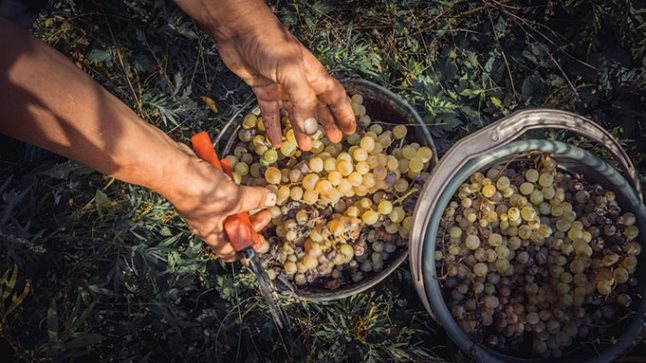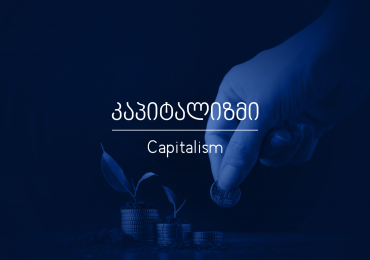ONE CAN SAY WITH CERTAINTY that the annual vintage has turned into one of the most important political events of the autumn season in Georgia. This year’s vintage was no exception, and the leading topic of national newscasts was the turmoil surrounding it. Some viticulturists, unhappy with the low price of grapes, demanded more subsidies. If their demands went unmet, they threatened to stage a “grape revolution”. However, the government did not agree with the viticulturists, and believed that the current subsidies were sufficient as they were. They felt that so-called “factory prices” should be regulated by the market and not the state.
Villagers know the market, along with its strict rules, but this was no solace for the farmers who counted on high grape prices. At least 1 lari per kilogram of grapes that was the pre-election promise. However, these kinds of promises often create over the-top expectations, and such expectations disrupt the natural balance between supply and demand, which sooner or later paves the way for a crisis. The solution to that impasse is usually found in subsidies funded by taxpayers, which actually deepens the crisis. It all resembles pouring wine into a bottomless pot.
If we look at Europe’s experience, we will see that it’s quite easy to introduce subsidies, but very hard to abolish or diminish them. Towards the end of the 1950s, when the countries of the European Community began to restore the agriculture destroyed during World War II, they introduced subsidies for farmers. This was deemed as a positive move universally. In 1968, the Mansholt Plan was established, which entailed a partial abolishment of state subsidies allocated for agriculture. Almost 50 years later, the discontinuation of these subsidies remains a leading issue on the EU’s political agenda.
Economists agree that the long-term effects of state-funded injections of the economy are detrimental. However, politicians don’t really care. The unpopular abolition of state subsidies could have a negative effect on the majority political party’s constituency – thousands of votes could be lost in the elections. Predictably, almost all governments avoid making such unpopular policy decisions.
However, it’s also impossible to blame the farmers, as they developed their farms hoping to receive subsidies, without which, many would go bankrupt. In short, subsidies are like drugs: they might act as painkillers, but do not heal the wound. Instead they destroy the organism, and weaning people off them is difficult.
Grape subsidies have a similar history in Georgia. The 2006 Russian embargo was a big blow to Georgian wine companies, many of which, never bothered to diversify their export markets. The catastrophic fall in wine sales decreased the demand for grapes and reduced their price. The government then assumed the management of the vintage with the pretext that they were saving the country’s viticulture sector. As a result, a “temporary” subsidization of the sector was implemented before the winemakers could find alternative markets.
An emphasis was placed on the US, European and Chinese markets, where it’s almost impossible to find a niche for low-quality wines. Therefore, winemakers began to improve their product, and began to launch marketing campaigns. As a result, if in 2005 the average price of a single liter of exported wine was $1.95,
in 2007-2012, the price rose to $3.25. Wine exports increased by 122% compared to 2007. This was accompanied by Georgian wine’s return to the Russian market in 2013. However, despite the increased export volume, subsidies allocated out of the state budget for vintages in 2013 and 2014 were still high. In fact, direct subsidies amounted to more than .60 million. In 2015, when the government was planning to eliminate the subsidies, export volume to Russia fell by
2.7 times, which once again underscored the necessity of finding new markets and diversifying export. As a result, the government continued the subsidies. However, it didn’t really save the day. In fact, this year, the highest price on grapes didn’t even equal the minimum prices on grapes from last year. As a result, farmers experienced difficulties in selling their product.
On the contrary, artificially increased grape prices encouraged farmers to expand their vineyards, which actually worsened the problem. Supply has increased, whereas wine factories have less and less demand. Wine companies began to build their own vineyards. Aside from bringing a few economic benefits, it enabled them to better control the quality, and use the same types of raw materials. This does not bode well for small viticulturists, whose competitiveness decreases every year. Under these circumstances, keeping the subsidies simply amounts to self-deception, as it will not resolve the issue at hand.
We can look for the solution by examining the experiences of European viticulturists. Unlike California or South America, the average size of European vineyards is fairly small. For example, in Germany, 55% of all vineyards are less than 3 hectares. In Austria, the average area of vineyards is no more than 2.3 hectares. Some viticulturists sell their grapes to wine factories, but most of them are producing wine themselves – they either do it independently or within cooperatives. This makes them less dependent on factories. Wine production creates added value, and farmers receive more profits.
Rather than encouraging overproduction through the use of subsidies, the stimulation of cooperatives and other types of associations offers the best solution. Farmers should realize that maintaining vineyards is a business – just like the cultivation of any other plant. They should also realize that they should plan such activities based on market developments.
Government-led vintages are quite an unusual phenomenon in Europe. That’s because there’s no need for it, as viticulture associations are well organized groups, and can regulate processes on their own. Given our current situation in Georgia, the abrupt discontinuation of the government’s involvement in the vintage would most likely result in disorganization and chaos. But the fact that managing vintages is not the state’s business is as clear as day. Maybe the government can effectively regulate queues and other types of organizational issues, but in recent years, the active involvement of the government in the vintage has caused farmers to forget that the buying and selling of grapes is a private business, and that the state shouldn’t be making the rules of the game. While the vintage has become a good way of scoring political points with voters, farmers, who have grown accustomed to the government’s active involvement in the process, place all the responsibility on the government, and ask for its help during the crisis (just like the one we had this year). Therefore, both the government and winemakers must come up with a joint plan on how to self-regulate the vintage based on sound market principles, how to reduce the government’s role, and how develop the sector based on market principles.
Finally, it goes without saying that wine is more than just an alcoholic beverage for our country, but its ancient purpose aimed to bring with it economic benefits. The dependence of wine production on the state budget will never bring any benefits to the country’s economy, and it’s doubtful that it will have a positive impact on the quality of Georgian wine either.
დატოვე კომენტარი















